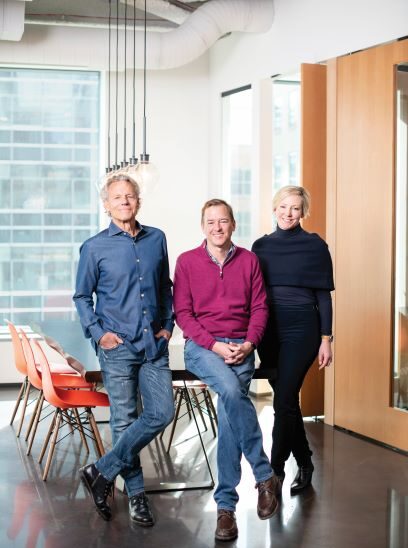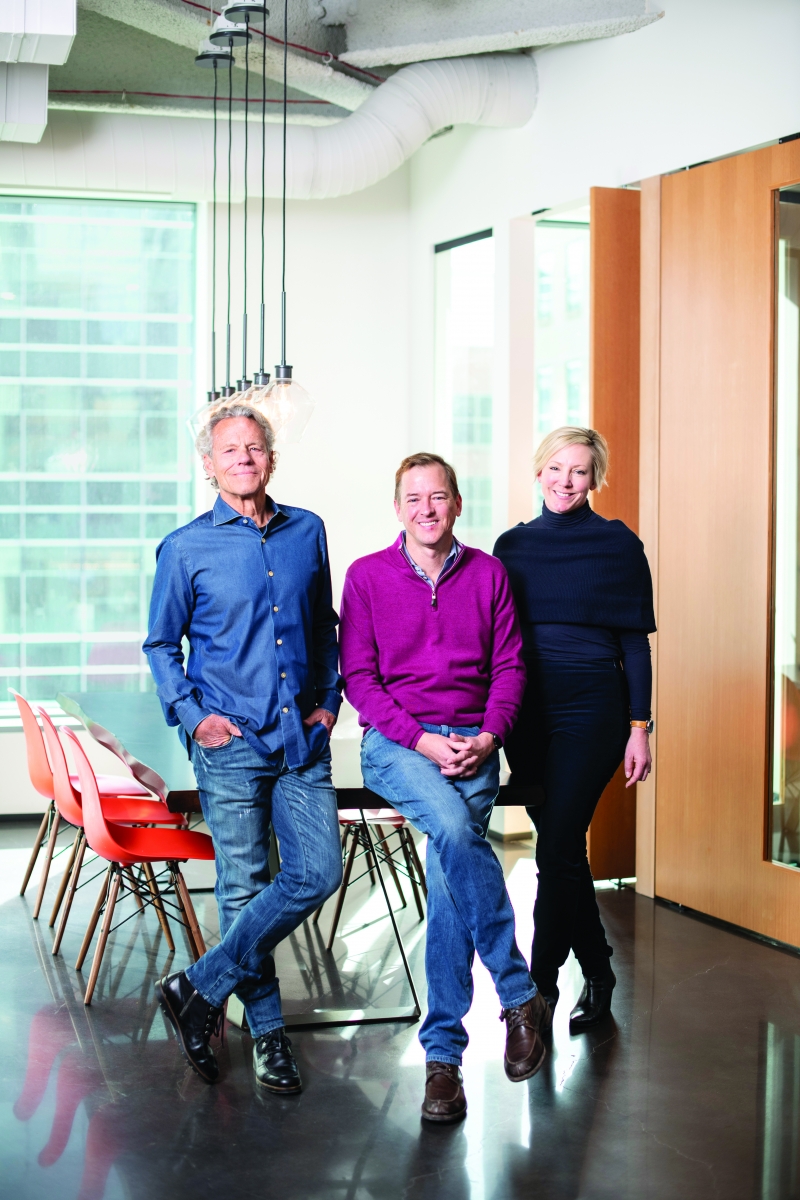Good Company: East West Partners
This development team has helped redefine Denver
Gigi Sukin //April 16, 2019//


Good Company: East West Partners
This development team has helped redefine Denver
Gigi Sukin //April 16, 2019//

Mark Smith, 67
Founder & development partner, East West Partners
Hometown: Denver
Chris Frampton, 47
Managing partner, EWP-Denver
Hometown: Charlotte, North Carolina
Amy Cara, 47
Managing partner, EWP-Denver
Hometown: Minneapolis
Website: EWpartners.com
Christmas Eve 2018 marked East West Partners’ 20th anniversary since dipping a toe into the Denver market. It was that day two decades ago when Mark Smith and Harry Frampton made a bet and signed a contract to buy a 25-acre parcel in Riverfront Park. The development team has since been active in the Mile High City’s renaissance, thoughtfully participating in the successes and challenges that have resulted in an impressive skyline and a thriving urban fabric. In addition to Riverfront, they were one of two master developers on the redevelopment of Union Station, which reopened in 2014.
With projects and properties in six time zones, East West Partners prides itself on teaming with cities to build robust communities. We sat down with Smith, founder and development partner, and managing partners Amy Cara and Chris Frampton, founder Harry Frampton’s son, to talk about the past and the future.
ColoradoBiz: Why did you decide to enter the Denver market 20 years ago?
Mark Smith: We were in the mountains and wanted to do something in Denver. My partner, Harry, heard talk about Denver. But his vision was: If you’re going to do something, do something worthwhile and big. So, there was this whole area of town that was untouched. We thought the proximity and location were great. Other people looked at the land, and no one had been able to make a deal with the seller. We kept it really simple.
Chris Frampton: A few years later, East West Partners bought another 8.5 acres and over the course of 20 years has become the master developer of 54 acres – really 20 city blocks.
CB: Talk about how the mission and values behind East West Partners – which originally began in 1986 in the Vail Valley – translated in Denver.
Amy Cara: The same ethos was carried to Denver – where people live can likewise have those great characteristics of being well thought out, with great service and great places to gather.
CB: How did the ’08 recession impact your real estate development firm?
CF: We were very fortunate to have been awarded Denver Union Station, and to be in the heart of creating the infrastructure at that time. It did mean we needed to slow down for a bit on our development of residential.
CB: What have been some defining moments or projects?
AC: I would say the Millennium Bridge across the Central Platte Valley. Initially that was going to be a fairly straight crossover.
MS: Yeah, an $11 million bridge defined and created a place there. The 16th Street Plaza – we built the first three buildings in Commons Park, brought 200 units right at the crux and voila, you had a community. You have to create a feel and a sense of place that isn’t copying old things, but that honors and respects the history of the area. It’s not the bars or restaurants. That comes because of the other activity. There are people there. It used to be a place people visited. Now, it’s a place where people live.
AC: As we were continuing in 2008, Union Station started to come together as an idea. Transit infrastructure completely changes the way you can finance things. We needed to find a way to have momentum. And in 2010, we were deep into the recession.
CB: East West Partners was one of two master developers involved in the redevelopment of Union Station. Describe that process.
CF: This was a one-time opportunity. One piece of land; it was next to downtown – and today it is downtown – and if was done wrong, that would have been that. There was no recovering.
Mark and Mark’s [Falcone, CEO of Continuum Partners] primary role was to lead the design, work with the public agencies to create the financing, identify how to construct the projects, and to put together the team to execute on all of that.
MS: We basically got to build a city inside a city. How many opportunities do you get to do that in your lifetime? Every sidewalk, light pole, bridge, laid out all the transit. We designed the canopies, designed the plaza behind the light rail platforms. We had a single-minded focus; a clear goal.
CF: If you look at Riverfront and Union Station, taken together, they’re the first two projects of any scale that were pedestrian-first, designed around the true urban experiences. Give or take 5,000 residential homes between the two neighborhoods [Riverfront and Union Station] – it demonstrated what was possible. These two projects changed everyone’s opinion about what Denver was. Before, it was a suburban city. In doing residential, it created a market for commercial.
CB: What do you think of downtown today?
CF: Essentially, we’ve filled up Union Station. There are tiny bits of space here and there. Along with VF Corp., going right across the street from the first outpost of WeWork, there’s DaVita. It’s interesting how, if you look at the office market, typically tenants churn in Denver. It’s fascinating how many people we’ve brought downtown, like Liberty Global from the suburbs and AutoDesk. The expansion of Denver created by Denver Union Station didn’t just pull tenants from midtown or uptown but instead brought companies into Denver from other cities or from the suburbs. It was a win for downtown as a whole.
CB: Talk about The Coloradan, expected to open early this year.
CF: The Coloradan is our crowning development in Denver Union Station. A terrific place to live, in that it celebrates the city as the amenity, yet also has places within for people to connect with their neighbors, including an urban farm and rooftop club and pool. This being our last building in this neighborhood, we wanted the design to be iconic and special.
CB: What are your greatest concerns for Denver?
AC: Denver as a whole has continued to evolve its thinking around affordable housing. We created our own affordable housing program. We ended up developing affordable for-sale and affordable-rent projects because between Riverfront Park and Union Station, there wasn’t an affordable housing plan. There’s affordable housing on-site at The Coloradan. Instead of buying out, affordable housing continues to evolve. The city will work it out through grants. It’s something we need to continue to analyze. But real cities have everybody. Real cities get it. I hope we can get there.
CF: We have welcomed the affordable housing ordinance since our purchase of the land. To that end, we agreed to an affordable component at the time of purchase, before the city had finalized the initial ordinance. And we helped to cause more affordable housing to be developed in the Central Platte Valley than was originally required by selling a parcel to an affordable housing developer when that could have been market rate, and by developing the affordable housing in The Coloradan rather than paying the fee in lieu. It was important to us that Union Station be inclusive, especially given the substantial public investment here.
CB: As definers of Denver, any words of wisdom you’d like to share?
CF: It always takes longer than you think. You have to be nimble. Don’t get too married to any idea. And don’t carry too much debt.






















